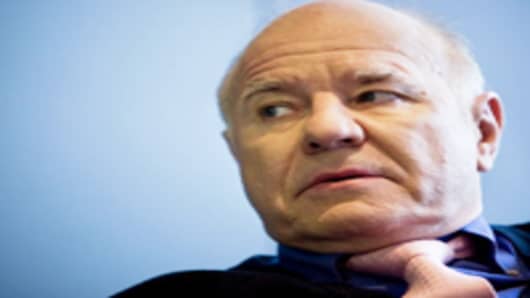Central bankers are “counterfeit money printers” and Federal Reserve Chairman Ben Bernanke should resign for messing up the U.S. economy so badly, Marc Faber, author of the Gloom, Doom and Boom, told CNBC on Friday.
He said Bernanke was one of the main proponents of an ultra-expansionist economic monetary policy that was to blame for the latest financial crisis.
“If I had messed up as badly as Bernanke I would for sure resign. The mandate of the Fed to boost asset prices and thereby create wealth is ludicrous — it doesn’t work that way. It’s a temporary boost followed by a crash,” Faber said.
Faber, who rose to prominence after predicting the 1987 financial crash report and dubbed "Dr Doom" for his negative predictions, said: “This unlimited QE (quantitative easing) , buying mortgage-backed securities (MBS) and continuing operation twist has the implication of simply having asset prices go up and the money flows down to the Mayfair economy,” Faber said.
A Mayfair economy is one which benefits the wealthier and better off in society. Faber said this latest round of QE would not help the “man on the street”.
“QE helps rich people whose asset prices go up and whose net worth then increases but it doesn’t flow to the man on the street who is faced with higher costs of living with price rises. You just have a small economy that is booming but the majority of the economy is damaged by QE,” he said.
Bernanke announced on Thursday that the Fed would buy $40 billion a month in MBS, giving the impression that this time around there would be no time limit to the program, which would only stop once a sustained uptick in employment is visible.
“The money printers are responsible for this crisis. If we continue with this expansionist monetary policy we won’t be facing a fiscal cliff it will be a fiscal grand canyon,” he added.
Mike Konczal, fellow at the Roosevelt Institute disagreed claiming that this latest round of QE — aggressive as it was — would expand the scope of Federal Reserve policy and was “great for main street”. Crucially, he said, it tackles the issue of employment which would underpin future wealth.
“If anything, monetary policy has been too tight in recent years. We’ve seen a collapse in GDP growth, no wage growth and huge rises in unemployment. Wealth is collapsing because of a collapse in the housing market and prolonged, mass unemployment ,” Konczal said.
Faber poured scorn on the notion that QE helps the economy, declaring that commentators like Konczal would have said the same in 2001 when low interest rates led to the biggest housing bubble in the United States. That in turn led to the financial crisis of 2008.
“If we have an economic crisis in the Western world it’s because the government makes up 50 percent or more of the economy. This is a cancer that is taking away people’s freedom,” he said.
By CNBC's Shai Ahmed, follow her on Twitter @shaicnbc


